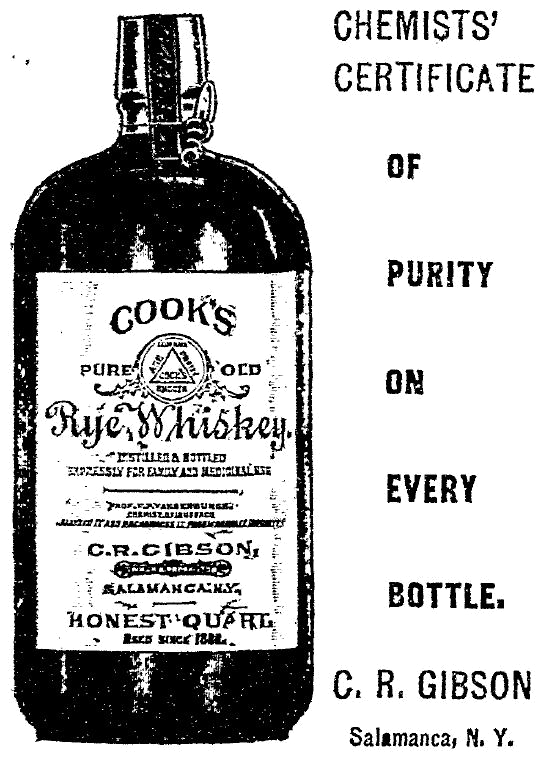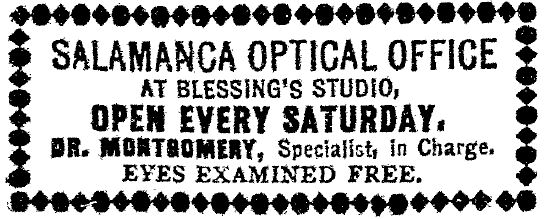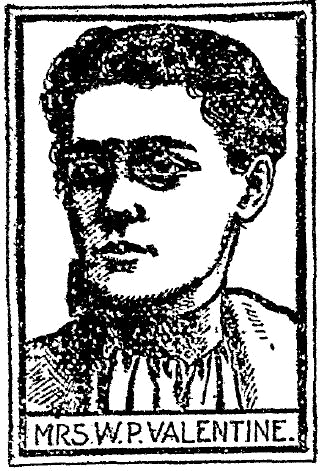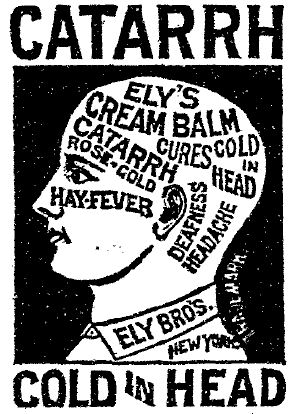| 7. | Cattaraugus Republican, September 20, 1901 |
S i c k W o m e nMrs. Valentine Tells HowLydia E. Pinkham's Vege-table Compound Cured HerHappiness will go out of your life forever, my sister, if you have any of the symptoms mentioned in Mrs. Valentine’s letter, unless yon act promptly. Procure Lydia E. Pinknam’s Vegetable Compound at once, it is absolutely sure to help you. Then write for advice if there is anything about your case you do not understand. You need not he afraid to tell the things you could not explain to the doctor—your letter will he seen only by women. All the persons who see private letters at Mrs. Pinkham ’s Laboratory, at Lynn, Mass., are women. All letters are confidential and advice absolutely free. Here is the letter: — " It is with pleasure that I add my testimony to your list; hoping
$5000 will be paid if this testimonial is not valid. SALAMANCA HOSPITAL NO. 26 MAIN S T ., SALAMANCA, N. Y.Rates (in advance) $3.00 per week, and actual expense of nurse and board in addition.
DIRECTORSF. C. Beals., W. H . Hazard, J. C. Krieger, O. S. Martin, J. G. Smith, P. H. Bourne, P. Berkery, F. H. Hicks, Mrs. G. N. Shedd,Mrs. A. M. Horth, Mr. H. O. Wait. Mrs. L W. Gibson. Mrs. B. D. Atwood, John J. Inman, Mrs. A. W. Ferrio, T. A. Heller, A. L. Sackett. Salina P. Colgrove. Hospital Staff.F. C. Beals, M. D.; O. S. Martin, M. D.; J. G. Smith, M. D.; P. H. Bourne, M. D , Salina P. Colgrove, M. D. 
--- THE GERMAN --- CANCER CURE.Only treatment removing both cause and effect; assuring cure. Write for testimonials of people who know. A. H, Wright, M. D ., Specialist, Perrysburg, N. Y. 
HOMES WANTED --- FAMILIES, both Catholic ad Protestant, willing to offer a good home to a families boy or girl of any age from infancy to ten years, and who will receive the care and training as will fit it for a life of self-support and usefulness, are invited to correspond with STATE CHARATIES AND ASSOTIATION, 101 East 22nd St., New York City |
FOR THE FAMILY CIRCLEANARCHY.
Tear down the law I Break up the creeds STORIES OF ROOSEVELTAn "Anecdotal Portrait of Col. Roosevelt," by Pernton Maxwell, published in the New Voice (New York) in May, 1899, tells these stories of the president. They are at least true to Mr. Roosevelt's character, as the country understands him: "Aggressive fighting for the right is the greatest sport the world knows." That is the formula after which Theodore Roosevelt has patterned every important act of his remarkable career. H e is a born fighter. Theodore Roosevelt’s popular nickname of Teddy was first applied to him while a student at Harvard. He had been in college less than a year when he did a thing which won for him the admiration and respect of juniors and seniors alike. This was the administering of a thorough and scientific drubbing to a fellow student, larger and more muscular man himself, but condemned as a bully of the worst type. The big fellow had singled out Roosevelt as the special object of his displeasure, and finally one day was challenged openly to combat in the big gymnasium at Cambridge. The challenge was accepted and the two youths met on the day fixed for the bout Teddy’s opponent was so anxious to beat his rival that while the two were in the act of shaking hands he sought to gain the advantage by landing a sharp blow on one Roosevelt’s ears with his free left hand. The blow was so obviously a foul one that the students who were gathered to witness the affair greeted the assault with cries of "shame!" Teddy, however, merely stood still and smiled. He made no move to strike and did not speak a word for fully a minute. Then, to the astonishment and discomfiture of his opponent, young Roosevelt bowed politely and extended his hand. The big fellow hesitated, but finally decided to grasp the extended hand in the true preliminary form. The bystanders greeted his action with such jeers as only college boys can voice. This time the bully took no advantage of his opponent and the boxing match began in proper style. It ended in just as proper style, too, for the thrashing the larger man received was severe enough to keep him abed for a week afterward. "The highest type of success in life is the result of strife," once remarked Gov. Roosevelt; and that he is a good fighter and a fair one he has demonstrated throughout his career. Another and even more exciting fistic affair befell him while roughing it in the west. It was oat is Men cad during a big roundup of cattle. The bad man who is always present upon such occasions was a local character known as Long Ike. This man had' the reputation of being quick with his shooting-irons and able to whip his weight in catamounts. He was tall, broad-chested and extravagantly muscular. He had imposed upon people for so long a time that he gradually came to believe in his own courage, though he was a miserable coward. At this particular roundup Roosevelt chanced to be one of a party in the only place of shelter on the prairie—the saloon. Long Ike sized up his man with a furtive glance and made his usual effort to impose upon the stranger. So sure was he that Roosevelt would submit that he did not take the precaution to make his usual bluff with his revolver. But Long Ike had reckoned without his host, Roosevelt was on him like a wild cat. He gave the insulting giant a half nelson and showed his practical knowledge of wrestling gained at college by throwing the big fellow heavily to the floor. Then he turned him over like a cat playing with a mouse, stood him up and ran him out of doors, taking the bully's revolver away in the brief trip from the bar to the doorway. Long Ike returned to the fray, glowing white with rage. Roosevelt tackled him again and threw him out with more vigor than before. The man did not rise from the ground for five minutes and when he did he was too dazed to continue the fight. Roosevelt’s style of attack was so entirely novel and so beautifully convincing that Ike made no attempt to resent it in the bad-man way. He sneaked away from camp, never to return. The cowboys of that section referred to Roosevelt from that day forward as "that holy terror with the eye glasses." As everyone knows, Gov, Roosevelt did not write his breezy books about big game hunting in the far west from material furnished at second hand. H e was as fearless in the pursuit of the grizzley[sic] bear as he was at a more recent date in the pursuit of lawbreakers in New York or still more recently of the Spanish enemy on San Juan Hill. His greatest achievement in the wild chase for dangerous quarry was in 1884, when he brought to earth a mountain bear that weighed 1,200 pounds. This happened in the Dakota wilderness and the story of the killing is of interest. At the time of the episode Roosevelt was established in Dakota as a rancher, but, being a millionaire, he was not looked upon by his cowboy neighbors as a sportsman of any considerable skill or prowess. His killing of the biggest bear in the state, however, made him at once an object of pride and envy to the community. With a trusted cowboy companion Roosevelt sallied forth one morning in quest of game. It came sooner than the two lone huntsmen had expected. They were riding a narrow trail when the cowboy called Roosevelt’s attention to a curious formation of rocks directly ahead of them, They drew rein and were gazing at the natural wonder when a ferocious growl came from behind it. A moment later a bear, black as crime, thrust his ugly snout over the shoulder of the rock. The rifles of both men were leveled at the monster in the same instant, but just as the cowboy was about to fire Roosevelt yelled at him: "Here, don’t shoot that bear I That’s my bear. I’ll shoot you if you shoot him!" The cowboy employee stood between |
Roosevelt and the advancing bear. While he had never before seen anything in the manner of his employer that had led him to believe Roosevelt would kill a human being, the look in the latter’s eyes and the tone of his voice made the cowboy lower his gun; the fact, too, that Roosevelt’s rifle was aimed directly at his head had something to do with his decision not to fire at the bear. Meanwhile, bruin had approached and was dangerously near the pair. The animal was in a killing rage, his eyes dilated and his teeth gleamingly wickedly. Fortunately for both knen Roosevelt’s aim was accurate and an hour later the bear’s hide was stretched in the sun. The cowboy then explained to his employer that he had been in haste to shoot simply because he feared the bear would kill both of them; that his thought was for Roosevelt’s safety rather than the desire to deprive him of the fame of bagging big game. This explanation made Roosevelt feel penitent for his harshness and to make amends he presented to the cowboy a silver-mounted Winchester and a pair of the finest corduroy breeches ever seen in Dakota. Long before the blowing up of the Maine in Havana harbor Mr. Roosevelt made the prediction that " we shall be compelled to fight Spain within a year," No one knew better than himself the chances of success in a war between this country and the Dons. As assistant secretary of the navy he bad done everything in his power to keep Uncle Sam’s protectors afloat in a state of preparedness war. His foresight was not always appreciated by those in higher official postilions. Soon after. he was appointed to his post in the navy department at Washington, in 1897, he asked for an appropriation of $800.,000 for ammunition for the use of the navy. The appropriation was made and a few months later he made another applu a'ioo tor luuds. He was asked what had been done with the first $800,000 worth of powder and shot. Looking through his spectacles with flashing eyes, Roosevelt blandly replied: ‘ Every cent of it has been spent in sharpening the tools of our sailors and every bit of powder and shot has been fired in practice." He was then asked what he was going to do with the $500,000 he had recently requested and he said with the same vigor of expression: "Going 10 use every ounce of that, too, within the next 30 days in practice shooting." To what extent the superb marksmanship in the war with Spain was due to this costly, but necessary practice it is impossible to say precisely; but that it had much to do With the smashing of Cervera’s fleet and the defeat of Montojo no one can gainsay. Senator Cushman K. Davis is on record as saying: "If it had not been for Roosevelt, we should not have been able to strike the blow that we did at Manila, and Admiral Dewey’s victory would not have gone into history as one of the most splendid achievements in modern warfare. Theodore Roosevelt’s philosophy of life is brief, but sound. "There are two things everybody should cultivate," he says. "First, the determination that you are going to have a good time as long as you live—I have no use for a sour laced man; and next, make up your mind that you are going to do something worth while, that you will work hard and do the things you set out to do." It is characteristic of Roosevelt that he never preaches what he does not himself practice. He is neither an aristocrat nor an anarchist, but a plain, wide awake American who understands human nature and has a genuine sympathy with every sort and condition of mankind. He dos not think that the governor of the state of New York or of any state, should be addressed with the title your excellency. A state ruler, in Gov. Roosevelt’s opinion, is not entitled to any such high sounding form of address. Governor is his official designation and expresses all there is to the office. He believes that the same rule applies to the president of the United States. And yet Theodore Roosevelt is not an iconoclast. A stranger once asked him, "Are you a Republican or a Democrat?" "My friend," he replied, "I am a Jeffersonian Republican and a non-partisan Democrat, and I am a not averse to new ideas in politics." Health RecordThe state department of health has
issued the report for July, showing the
conditions of the month, giving first the population; second, total number oi
deaths; third, annual death rate per
1,000, and fourth the number of deaths
of persons under five years of age. The
following is the record for the Southern
tier district:
Pennsylvania Railroad Reduced Rates to San Francisco. On account of the Triennial Convention of the Protestant Episcopal church, to foe held at San Francisco, beginning October 2, the Pennsylvania railroad company will sell round-trip tickets to San Francisco from all points on its line at greatly reduced rates. Tickets will oe sold September 18 to 25, inclusive, and will be good to return to leave San Francisco not earlier than October 3, and only on date of execution by Joint Agent, to whom a fee of fifty cents must be paid, and passengers must reach original starting point by November 15, 1901. The Pennsylvania Railroad company will also run a personally conducted tour to the Pacific coast on this occasion by special train, starting September 23 and return October 22. Round trip rate, $185. For further information apply to ticket agents, or address Geo. W. Boyd, Assistant General Passenger Agent, Philadelphia, Cincinnati Excursion Account Fall Festival, The agents of the Erie Railroad will sell tickets to Cincinnati, O,, and return, at one fare for round trip; on sale Sent. 15, 16, 23-24, with return limit of seven days from date of sale. Full information from Erie ticket agents |
|||||||||||||||||||||||||||||||||||||||||||||||||||||||||||||||||||||||||||||||||||||||||||
 it may induce others to avail them selves of the benefit of your valuable remedy. Before taking Lydia E . Pinkham's Vegetable Compound
I felt very badly, was terribly nervous, and
tired, had sick headaches, no appetite , gnawing pain in stomach, pain
in my back and right side, and so weak I could scarcely stand. I was not
able to do anything. Had sharp pains all through my body. Before I had
taken half a bottle of your medicine, I found myself improving. I
continued its use until I had taken four bottles, and felt so well that I
did not need to take any more. I am like a new person, and your
medicine shall always have my
praise." — Mrs.
it may induce others to avail them selves of the benefit of your valuable remedy. Before taking Lydia E . Pinkham's Vegetable Compound
I felt very badly, was terribly nervous, and
tired, had sick headaches, no appetite , gnawing pain in stomach, pain
in my back and right side, and so weak I could scarcely stand. I was not
able to do anything. Had sharp pains all through my body. Before I had
taken half a bottle of your medicine, I found myself improving. I
continued its use until I had taken four bottles, and felt so well that I
did not need to take any more. I am like a new person, and your
medicine shall always have my
praise." — Mrs.  NASAL
NASAL